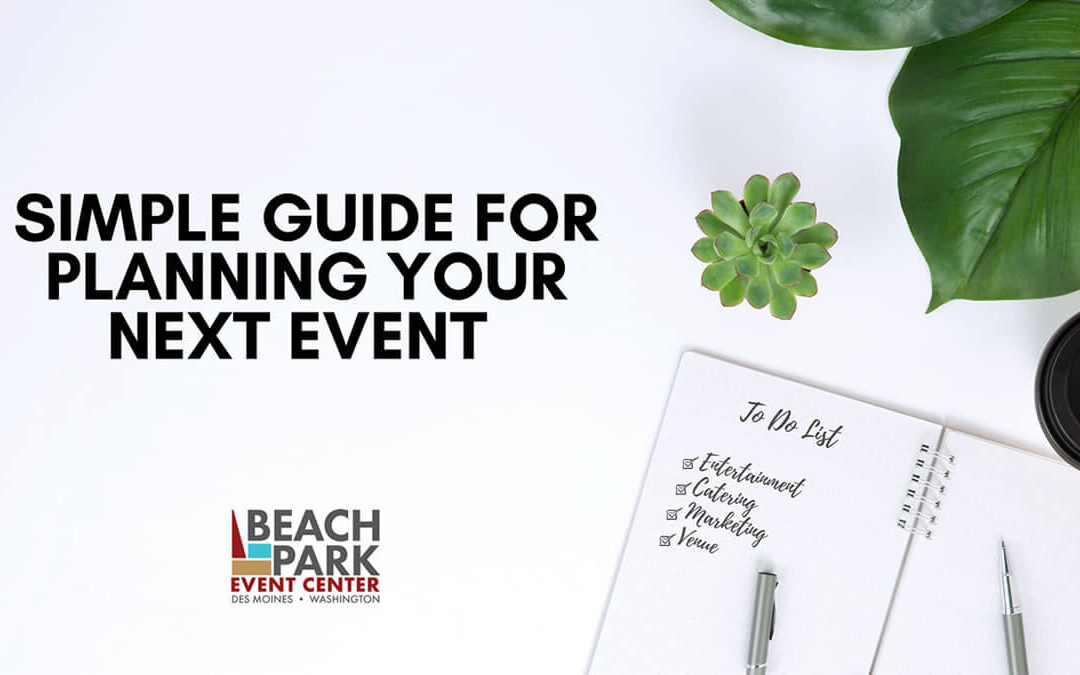Are you planning an annual company party, quarterly stakeholder meetings, or training events? No matter what type of company events you’re planning, planning and managing events takes time. If you are like most employees tasked with planning a company event, your time is in short supply. Use this 12 step guide to save time, reduce stress, and increase your event’s success. Use the downloadable templates to track your progress, vendors, and your budget.
- Create or Download an Event Checklist
A comprehensive event checklist will get you off to a strong start. It efficiently organizes all of your event tasks in one place. Meet with your boss, executive team, or board to ensure that all tasks are listed, delegated to the correct team member, and the due date for each is accurate. Timely check-ins or reminders help everyone involved stay on track. Download checklist - Establish Your Company Event Essentials
– Date and Time
Where will the event happen, and what time? When is the best time of year to hold your event based on the availability of attendees?
– Location
This includes the city and state your event occurs in, along with the venue. Pick a place your attendees can easily reach or a venue they would happily travel the extra mile to reach so they can enjoy a unique event experience!
– Type of Event
The kind of event you are planning will significantly impact the planning needed to accomplish your event goals.
– Event Goal
What is the overall reason for hosting your company event? Are you hosting a new product launch for clients or throwing an employee appreciation event? Do you want to educate your staff or to get your distribution chain excited about your products? Knowing your event goals makes it easier to design engaging and appropriate content for your attendees.
– Event Objectives
How will you measure whether you have met the event goal? Surveys can measure what attendees learned at your educational event. Product orders or the number of product demos conducted can gauge the success of a product launch.
– Audience
It’s essential to understand the expectations your attendees have for your company event. If you don’t meet their needs, the desired guest action is less likely to happen. - Draw up your Event Budget
Creating your event budget is an essential step in the event planning process. Start general to get a basic idea of event costs versus your available budget, then become more specific as smaller tasks appear. - Create the Event Design
Remember to consider your event program, room layouts, and overall themes when creating your event design. - Plan the Décor
Fluidity of design will keep you and your event staff on track when designing website updates, print materials, and even when choosing tablecloths. Consider all five of your attendee’s senses and how the décor will evoke the response you want. - Food and Drink
Listen to your attendees and get creative! People look for new and exciting things to try without completely stepping out of their comfort zone. Food and beverage can create community among your attendees and excite them about the rest of the event’s programming. Talk with multiple caterers to learn about new trends and get ideas. - Hire Entertainment and Plan Guest Experiences
Plan your attendees’ experience from the moment they register to the time they walk out the door. This could include hotel and flight arrangements, green rooms for keynote speakers, and transportation. Entertainment comes in many forms. Do your attendees love photo booths? Will they hop on stage for karaoke? Create an opportunity for your attendees to let their guard down and create community with the other attendees. - Map Out a Marketing Plan
Marketing is essential to getting the word out to your desired audience. Create a marketing timeline outlining when to send emails and print materials and when to launch social media posts and website updates. Don’t forget hashtags! Marketing doesn’t end when your event begins! Marketing should happen throughout your event to keep your attendees engaged and get them excited about your next big event! - Plan for Little Details and the Unexpected
Create a list complete with back up plans for any incidents that could occur during your event. Remember to keep a calm and level head when unexpected issues pop up; in many cases, you can resolve them before your attendees even know they happened! - Create a Chart of Event-Day Logistics
A day-of timeline will keep you on track and get you back on track quickly if the unexpected happens. - Post-Event Follow-Up
Contact your attendees right after your event while they are still excited about the activity. Easy surveys can engage your attendees and capture great feedback to make your next big event an even greater success for everyone! - Debrief and Write a Post-Event Analysis How did your company event go? What were the challenges? What would you change? Important details will escape your mind shortly after your event. Make notes during and right after your event while everything is still fresh so you can revisit them when starting next year’s checklist!
Event Planning Checklist
Download your event planning checklist. Sheet one is a simple checklist. Sheet two is a vendor and budget template. Edit both to meet your event and team’s needs.
Are you looking for a great venue near Seattle or Tacoma? The Beach Park Event Center in Des Moines, WA has event rental spaces for small, medium, and large company events. Surrounded by nature and just off the water, your attendees will enjoy scenic water and mountain views.
Contact us today to discuss your wedding and to schedule a virtual or in-person tour.

